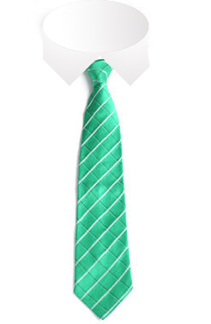 I was at a business meeting when I was approached by a
friend of mine. She complemented the tie I was wearing, then, with a bit of a
smirk, said she appreciated vintage
neckwear! To be able to understand her whimsy, you need to know that I was
running on a tight schedule when I was dressing for my day and pulled a tie out
from the back of my closet. It was a nice tie, but I had not worn it in
probably 15 years. My wife, typically the guardian of my daily attire, was not
available, so I knotted up my old tie and went on with my day.
I was at a business meeting when I was approached by a
friend of mine. She complemented the tie I was wearing, then, with a bit of a
smirk, said she appreciated vintage
neckwear! To be able to understand her whimsy, you need to know that I was
running on a tight schedule when I was dressing for my day and pulled a tie out
from the back of my closet. It was a nice tie, but I had not worn it in
probably 15 years. My wife, typically the guardian of my daily attire, was not
available, so I knotted up my old tie and went on with my day.
Vintage is a good word when you are describing things that
age well. A vintage bottle of wine, a vintage Cadillac, a vintage book, etc.,
all depict class and value by the use of the adjective. However, if I were to
use the word vintage in conjunction with items that don’t age so well, it would
be a big turnoff. A vintage chicken salad sandwich doesn’t have the same appeal
as a vintage diamond necklace, does it?
Words matter, especially in marketing where you are trying
to grab the attention of a customer and help them to understand and remember
what you are selling. Let’s examine these three areas.
Headlines: Do I have
your attention?
Marketing is all about getting the attention of potential
customers. Ever since PT Barnum rolled his traveling circus from town to town; making
big, bold statements in advance of a sale is one of the necessary places where
words really matter. Barnum would place newspaper ads and put up posters in a
city weeks before the circus came to town. You may not be trying to get people
to see the Fejee Mermaid, the World’s Tiniest Man or the Dog-faced boy, but you
may be trying to get them to look at your ad or read your blog. The words you
use in headlines are critical to your marketing success. In many cases, it is
the only thing that a customer will see. It needs to be short and to the point
to be memorable. But it also has to create intrigue to be of any marketing
value.
Do you understand the
difference between us and them?
One of the key components to good marketing is a campaign
that emphasizes the differences between your brand and the competition. We
typically start this process with a Unique Selling Proposition (USP) that
highlights your products and services ability to solve problems for your
customers. These points need to be honed down to simple statements that stand
behind your brand and are used in all your advertising. USPs are not long. In
fact, the shorter the list, the better the customer will understand why they
would buy from you and not the competition. Again, the words you use need to
written for maximum impact. We build advertising campaigns, including slogans,
from the USP.
Do I remember what you said?
One of the most significant places where words matter in
marketing is in a company’s tagline. A tagline summarizes the finest point of
distinction between a brand and its competition. In a nutshell, a tagline
defines the brand. We suggest that a tagline be only seven syllables or less. Beyond
that the human brain will have trouble remembering it. If you cannot remember
the tagline, you run the risk of your target market not really knowing exactly
what the brand represents.
Take this quiz. Can you tell me what brand is represented by
their tagline?
- Cover the earth
- Who are you when you’re hungry?
- Get there
- 100% Juice
- Have it your way
- Zoom zoom
Taglines also need to fit what you do. If you are selling
items at a discount, the tagline should reflect this. If you are selling on
quality, the tagline should point you in that direction. It should also pack a
bit of an edge. In a few words, it should register what your brand is all
about.
So I wore my vintage tie with great honor during the
business meeting I was attending. At the end of the day, I put it back in the
rack at the back of my closet and have not worn it since then. Words matter in
marketing. Make the most of them.
_______________
Answers to the quiz:
1. Sherwin
Williams paint
2. Snickers
chocolate bars
3. Uber
4. Juicy
Juice
5. Burger
King – However, they have been using another tagline "Be your way” since 2014
and is transposed over the older (since 1974) "Have it your way.”
6. Mazda
Motors